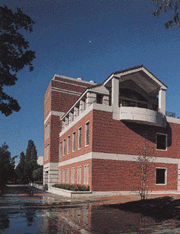The Loker Hydrocarbon Research Institute

Photo: Adrian Velicescu
Located at the heart of the University of Southern California campus in Los Angeles, California, the Loker Institute’s 43,000 square feet building features well-equipped state-of-the art laboratories and an attractive work environment. The George and Judy Olah library and the splendid reading room atop the building greatly facilitate the research and educational efforts. The Institute’s plant and equipment represents an investment in excess of twenty-five million dollars. These assets were provided through private donations. At any time about 60 researchers work in the Institute. Their work is ably-supported by a small, but dedicated administrative and technical staff. Financial support for the Institute’s work comes from an annual budget and salaries appropriated by the University, research grants and contracts, income from endowment funds, gifts and donations, as well as income from patents of Institute scientists.
There are four endowed professorships associated with the Institute. The overall annual operational cost of the Institute amounts to about five million dollars. To assure the long-range stability of the Institute, our friends and supporters established endowments, which are augmented continuously. Income from these endowments supplement operating funds, and allows the Institute to carry out exploratory pioneering research. It also makes possible visits and lectures by outstanding national and international scholars and supports scientific symposia hosted by the Institute. An advisory board chaired by Mrs. Katherine Loker, oversees the work at the Institute.
 |
Dr. Olah receiving the 1994 Nobel Prize in Chemistry Copyright © Pressens Bild AB Photo: Jan Collsiöö |
Scientific and Educational Goals
The Loker Institute’s goal is to further fundamental research and advanced training in the broad area of hydrocarbon research. Its work has been guided since its inception by its director, Nobel Laureate Professor George A. Olah.
To date, the Institute’s scientific work has resulted in over 1000 refereed publications in leading technical journals and more than a dozen monographs and books dealing with fundamental research on hydrocarbons. Scores of patents have been issued based on discoveries at the Institute, some of which resulted in industrial processes (vide infra).
A growing need for research in the area of hydrocarbon chemistry also implies an increased demand for chemists who are trained in this field of science. An essential part of the Loker Institute’s mission is to train future generations of scientists by creating and maintaining an educational environment which fosters innovative and practical research in the advanced chemistry of hydrocarbons while helping individuals realize their scientific and academic potential. Since its inception, the Institute has trained more than 300 Ph.D. and post-doctoral fellows who have come from all corners of the world to the Institute. Graduates of the Institute have excelled in both industry and academia. Their success is a testimony to the Institute’s efforts.
Nobel Prizes and laureates
Six prizes were awarded for achievements that have conferred the greatest benefit to humankind. The 14 laureates' work and discoveries range from quantum tunnelling to promoting democratic rights.
See them all presented here.
